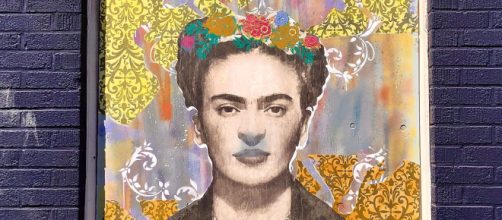"Fridamania." It's an actual thing. It lives and grows. Besides the multiple films, documentaries, and shorts about the artist's life and work, not to mention the 2002 award-winning biopic "Frida," also about her life and work, now we're going to get a TV series about – you guessed it – her life and work.
In the announcement from Variety, Frida's grandniece, Mara Romeo Kahlo, is quoted saying the TV series will portray the artist "as she has never been seen before."
Will the real Frida Kahlo stand up?
Do you mean there's more to the story than what the biopic recounted or the book it was adapted from – Hayden Herrera's 1983 book "Frida: A Biography of Frida Kahlo"?
Certainly, her fans would want to know.
Ever since she died in 1954, Frida's popularity has mushroomed. Her face appears on shirts and socks and what-not, even nail polish. Madonna calls her a personal hero.
So goes Fridamania. Her Mexican costumes make her popular with the fashion crowd. Her affairs with both sexes put her right with the non-gender-specific crowd, and her fierce independence makes her a feminist darling. And perhaps the handicapped among us favor her, too. What else is there to know?
Kahlo's popularity showed its worshipping face at the Dallas Museum of Art in 2017 when 1,100 women dressed up like the artist to celebrate her 110th birthday.
And get this. Even a Harvard professor includes Kahlo in a homework assignment for her students.
María Luisa Parra-Velasco, who specializes in Hispanic linguistics, assigned classes to identify Kahlo's presence in their communities – whether it's nail polish, lip gloss, a Kahlo-themed restaurant, or a bar of soap.
Then she asks them to share their findings on a web portal with other countries like South Africa and Brazil – apparently in a "we-are-the-world" spirit. One might say that the professor not only participated in Fridamania, but she's also perpetuating it.
Of course, this is not the world's first mania. In the 1960s, fanaticism was aimed at the Beatles, the English rock band. Such fandom is not necessarily a bad thing. Considering all mass shootings in the U.S., Fridamania seems harmless for a mania.
My concern is what a TV series about this artist's presumed unknown life and work will do to her, her art, and her art. I'm thinking of the cringe-worthy biopic "Lust for Life" in 1956 with Kirk Douglas as Van Gogh that made him out to be a madman.
Douglas attacking his canvases with the same ferocity he used to fight the Germans in the movie "Paths of Glory" turned him into a caricature.
Stretching the truth?
Will the proposed TV series about Kahlo also distort? Her grandniece's goal, "to present a unique perspective based to show how the artist "really lived her life," raises questions.
How much was a grandniece privy to the artist's personal life? And Is she dissing Herrera's biography on which the biopic was based? If so, that's a whole lot of dissing.


